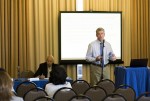UCLA faculty members expressed their opinions and concerns about the new University of California-wide pension plan at a town hall meeting Thursday.
Susan Cochran, vice chair of the UCLA Academic Senate, said the senate held the meeting to better understand faculty opinions before making recommendations to the systemwide senate.
The University will receive a one-time $436 million contribution to the UC Retirement Plan, paid over three installments, as part of the May budget agreement between UC President Janet Napolitano and Gov. Jerry Brown. The contribution will be approved if a new pension tier is introduced for employees hired on or after July 1, 2016.
Napolitano appointed the Retirement Options Task Force to develop a proposal, released Jan. 15, that introduced a new pension tier.
Under the existing defined benefit plan, the UC capped the amount of pay that goes toward an employee’s pension at the Internal Revenue Code limit of $265,000. Under the proposed plan, employees will be offered a choice between a defined benefit plan with a supplement and a defined contribution plan.
The defined contribution plan cap will be reduced to $117,020 to mirror other statewide pension plans like CalPERS. To offset the margin between the two caps, the task force introduced a defined benefit plan with a supplemental contribution for employees who earn more than $117,020 and less than the IRC limit of $265,000.
Shane White, a professor in the UCLA School of Dentistry and member of the task force, said he thinks the new pension tier will improve the unfunded liability of the retirement fund. He added he thinks the UC’s benefit reforms and internal borrowing have already stabilized the liability.
“(The proposal) is not something we wanted,” White said.
Daniel Mitchell, a board member of the Faculty Association at UCLA, said the state stopped contributing to the pension fund in the 1990s because it was overfunded.
“If nobody puts money in, despite the fact that it’s overfunded, gradually you work yourself down to the point where it needed funding,” said Mitchell, a professor emeritus in the schools of management and public affairs.
Cochran, a professor in the School of Public Health, said she thinks Brown and Napolitano reached an agreement last fall because the state wanted the University to cut costs, and the University wanted the state to contribute to the pension fund.
Under the proposal, the new cap reduces the retirement benefits for future hires and employees who are or will be paid a salary above the new cap, Mitchell said. He added the proposal’s cost constraint limited the task force’s ability to offer attractive benefits.
Cochran said in the absence of a reliable pension plan, the University will be less attractive to new employees and will damage retention.
“Historically, even though the salaries lagged, (the UC) had a better pension and so it kind of balanced out,” Cochran said. “Now, we’re removing the better pension, so it’s going to make it harder to recruit people.”
Cochran added she thinks it was unusual for Brown and Napolitano to make a closed-door deal. She said she thinks the Academic Senate should not have been excluded from the negotiations.
Tobias Higbie, chair of the Faculty Association at UCLA and associate history professor, said he thinks the senate should reject the task force’s proposal.
White said he doesn’t think the senate can reject the proposal because the state legislature has already approved the deal, and the UC has already received the first installment of the $436 million payment.
“We can’t walk away from this,” White said. “What will be the next step if (the faculty) rejects the proposal?”
He added he thinks the senate should lobby to increase the supplement to the defined benefit plan to compensate for the lower cap.
Mitchell said he thinks the governor and state legislature have not committed to further contributions to the pension fund, beyond the one-time $436 million payment spread out over three years, because the state continues to believe the UC’s pension is not its responsibility.
“I don’t have to worry about this, I’m a retiree, I’ll be long gone before any of this happens,” Mitchell said. “But if you’re a regent to the University, you’re supposed to be worried about the long term – 50 or 60 years.”
Leo Estrada, chair of the UCLA Academic Senate, said the senate will take comments from the Faculty Welfare and other senate committees and individual faculty members before submitting UCLA’s response by Feb. 3.
He said a senate review committee will then review the response and pass it on to the UC Academic Senate. The senate will present the UC Board of Regents with its final recommendations at the bimonthly regents meeting in March.
